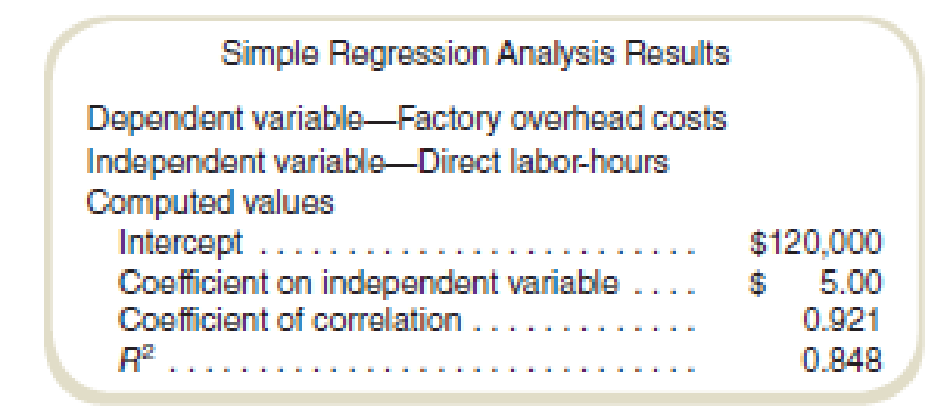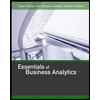
Concept explainers
Interpretation of Regression Results: Multiple Choice
Cortez Company is planning to introduce a new product that will sell for $96 per unit. The following

Manufacturing

Required
- a. What percentage of the variation in overhead costs is explained by the independent variable?
- (1) 84.8%.
- (2) 45.0%.
- (3) 92.1%.
- (4) 8.48%.
- (5) Some other amount.
- b. What is the total overhead cost for an estimated activity level of 50,000 direct labor-hours?
- (1) $120,000.
- (2) $370,000.
- (3) $250,000.
- (4) $320,000.
- (5) Some other amount.
- c. How much is the variable manufacturing cost per unit, using the variable overhead estimated by the regression (assuming that direct materials and direct labor are variable costs)?
- (1) $88.00.
- (2) $82.00.
- (3) $86.80.
- (4) $72.00.
- (5) Some other amount.
- d. What is the expected contribution margin per unit to be earned during the first year on 20,000 units of the new product? (Assume that all marketing and administrative costs are fixed.)
- (1) $96.00
- (2) $24.00
- (3) $56.00
- (4) $14.00
- (5) Some other amount.
- e. What is the manufacturing cost equation implied by these results?
- (1) Total cost = $640,000 + ($5.00 × Number of units).
- (2) Total cost = $120,000 + ($86.80 × Number of units).
- (3) Total cost = $120,000 + ($72.00 × Number of units).
- (4) Some other equation.
a.
Identify the appropriate answer for the given statement from the given choices.
Answer to Problem 45E
Option (1) The percentage of the variation in overhead costs is 84.8%.
Explanation of Solution
Regression analysis:
Regression analysis is used to show the relationship between the cost and the activity. It is used to estimate the cost at various level of activity.
The most important step in the calculation of regression analysis is to establish a logical relationship between the cost and the activity. The activity (independent variable) is placed on the right-hand side and the cost (dependent variable) is placed on the left-hand side of the graph.
Percentage of the variation in overhead costs is explained by the independent variable:
The percentage of the variation in overhead costs is 84.8% as per the value of R2.
Justification for the correct and incorrect answer:
(1)
84.8%: This is the correct figure as the value is equal to the value of R2.
(2)
45.0%: This is an incorrect figure as the value is not matching with the value of R2.
(3)
92.1%: This is an incorrect figure as the value is not matching with the correct value of 84.8%.
(4)
$14.00: This is an incorrect figure as the value is not matching with the value of R2.
(5)
Some other amount: This is an incorrect option as the value is 84.8% is given above in the option.
b.
Identify the appropriate answer for the given statement from the given choices.
Answer to Problem 45E
Option (2) The total overhead cost is $370,000.
Explanation of Solution
Total overhead cost:
Total overhead cost is the total cost of the given overhead. It consists of fixed cost and variable cost.
Calculate the total overhead cost:
Thus, the total overhead cost is $370,000.
Justification for the correct and incorrect answer:
(1)
$120,000: This is an incorrect figure as it is not matching with the total overhead cost of $370,000.
(2)
$370,000: This is the correct figure as the total overhead cost is $370,000.
(3)
$250,000: This is an incorrect figure as the value is not matching with the correct value of $370,000.
(4)
$320,000: This is an incorrect figure as the value of total overhead cost is $370,000
(5)
Some other amount: This is an incorrect option as the value is $370,000 is given in the above options.
c.
Identify the appropriate answer for the given statement from the given choices.
Answer to Problem 45E
Option (2) The variable manufacturing cost per unit is $82.
Explanation of Solution
Variable manufacturing cost:
Variable manufacturing cost is the cost of production that varies with the change in the volume of the production.
Calculate the variable manufacturing cost per unit:
Thus, the variable manufacturing cost is $82.
Working note 1:
Calculate the labor cost per unit:
Working note 2:
Calculate the total labor hours:

Justification for the correct and incorrect answer:
(1)
$88.00: This is incorrect figure is not as per the above calculation of 40,000 direct hours.
(2)
$82.00: This is the correct figure as the figure is matching with the calculated figure of $82
(3)
$86.60: This is an incorrect figure as the value is not matching with the correct value of $82.
(4)
$72.00: This is an incorrect figure as the value is $82.00.
(5)
Some other amount: This is an incorrect option as the value is $82.00 is given above option.
d.
Identify the appropriate answer for the given statement from the given choices.
Answer to Problem 45E
Option (4). The expected contribution margin is $14.00.
Explanation of Solution
Contribution margin:
The surplus of sales price over the variable expenses is known as the contribution margin. It is computed by deducting the variable expenses from the sales revenue. The contribution margin income statement is made to record the contribution margin.
Calculate the estimated contribution margin:
Thus, the estimated contribution margin is $14.
Justification for the correct and incorrect answer:
(1)
$96.00: This is an incorrect figure as it is not as per the above-calculated value of $14.
(2)
$24.00: This is an incorrect figure as per the figure is not matching the calculated figure of $14.
(3)
$56.00: This is an incorrect figure as the value is not matching with the correct value of above-calculated figure $56.
(4)
$14.00: This is the correct figure as per the above calculation.
(5)
Some other amount: This is an incorrect option as the value is $14 is given in the above options.
e.
Identify the appropriate answer for the given statement from the given choices.
Answer to Problem 45E
Option (4) The manufacturing cost equation is:
Explanation of Solution
Cost equation:
Cost equation is a mathematical representation of the cost estimation at various level of activity. It is used by defining the fixed cost, and variable cost per unit. The variable cost per unit is multiplied by the given variable to calculate the relative cost.
Calculate the manufacturing cost equation:
Thus, the manufacturing cost equation is:
Justification for the correct and incorrect answer:
(1)
(2)
(3)
(4)
Some other equation: This is the correct figure as the correct answer is not given in any of the above options.
Want to see more full solutions like this?
Chapter 5 Solutions
FUND.OF COST ACCT >CUSTOM<
- Critically assess the role of the Conceptual Framework in financial reporting and its influence onaccounting theory and practice. Discuss how the qualitative characteristics outlined in theConceptual Framework enhance financial reporting and contribute to decision-usefulness. Provideexamples to support your analysis.arrow_forwardCritically analyse the role of financial reporting in investment decision-making,emphasizing the qualitative characteristics that enhance the usefulness of financialstatements. Discuss how financial reporting influences both investor confidence andregulatory decisions, using relevant examples.arrow_forwardHelp need!!arrow_forward
- Assess the role of modern accounting theories in guiding research in accounting.Discuss how contemporary theories, such as stakeholder theory, legitimacy theory, andbehavioral accounting theory, shape research questions, hypotheses formulation, andempirical analysis.arrow_forwardNeed answerarrow_forwardDefine research methodology in the context of accounting theory and discuss theimportance of selecting appropriate research methodology. Evaluate the strengths andlimitations of quantitative and qualitative approaches in accounting research.arrow_forward
- Critically evaluate the progress and challenges in achieving a single set of globalaccounting standards. Discuss the benefits and drawbacks of globalization inaccounting, providing relevant examples.arrow_forwardMany experts using ai tools and giving incorrect solutions . pls give correct answer when you 100% sure . if you have problem with image comment i will write valuearrow_forwardStep by step correct answer. without using chatgpt. answer should be coarrow_forward
 Essentials of Business Analytics (MindTap Course ...StatisticsISBN:9781305627734Author:Jeffrey D. Camm, James J. Cochran, Michael J. Fry, Jeffrey W. Ohlmann, David R. AndersonPublisher:Cengage LearningPrinciples of Accounting Volume 2AccountingISBN:9781947172609Author:OpenStaxPublisher:OpenStax College
Essentials of Business Analytics (MindTap Course ...StatisticsISBN:9781305627734Author:Jeffrey D. Camm, James J. Cochran, Michael J. Fry, Jeffrey W. Ohlmann, David R. AndersonPublisher:Cengage LearningPrinciples of Accounting Volume 2AccountingISBN:9781947172609Author:OpenStaxPublisher:OpenStax College Managerial Accounting: The Cornerstone of Busines...AccountingISBN:9781337115773Author:Maryanne M. Mowen, Don R. Hansen, Dan L. HeitgerPublisher:Cengage Learning
Managerial Accounting: The Cornerstone of Busines...AccountingISBN:9781337115773Author:Maryanne M. Mowen, Don R. Hansen, Dan L. HeitgerPublisher:Cengage Learning Excel Applications for Accounting PrinciplesAccountingISBN:9781111581565Author:Gaylord N. SmithPublisher:Cengage Learning
Excel Applications for Accounting PrinciplesAccountingISBN:9781111581565Author:Gaylord N. SmithPublisher:Cengage Learning



